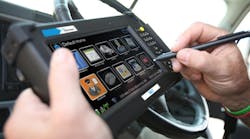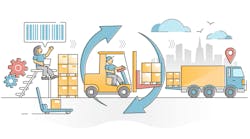Canada is in the process of imposing a requirement that domestic truckers install and use electronic logging devices (ELDs) that have been certified by a third party – unlike the United States, where ELD suppliers are allowed to self -certify their devices.
If Canadian truckers have their way, the same third-party certification requirement will apply to devices on U.S. trucks that cross the border some time in the future.
The current Canadian federal regulations requiring ELDs is being phased in, with a hard deadline for truckers to have the devices installed of June 12, 2021. As is the case in the U.S., ELD are intended to support enforcement of Canada’s hours-of-service rules for commercial drivers. In many ways, the Canadian ELD regulations are similar to those currently being enforced in the U.S., although the HOS rules differ somewhat.
The certification requirement is the major point where they differ. At present, however, the Canadian government has yet to designate an accredited certification body to certify ELD manufacturers, and it could take more than a year to do so. The new devices also will need to meet the Technical Standard for Electronic Logging Devices developed by the Canadian Council of Motor Transport Administrators (CCMTA).
“Now is the time for Canadian fleets to start transitioning to ELDs,” says Kyle Dodsworth, ELD regulations specialist with Geotab, a U.S.-based company that provides open platform fleet management solutions, including an application designed for use with ELDs.
One difference is that Canadian drivers will not transfer logs electronically to a federal system like the Electronic Record of Duty Status (eRODS) software in the U.S. used by safety officials to locate, open, and review output files transferred from a compliant ELD. In Canada, drivers will need to email a specially-created transfer file to officers, and those officers eventually may have software to convert the file into a readable format. The industry awaits more details on this process, Dodsworth notes.
Because Canadian HOS rules are quite different than those in the U.S., he says carriers should choose an ELD vendor that supports them completely and which is committed to achieving third-party certification when it becomes available. U.S. carriers who cross the border currently use ELDs that are capable of switching between generating reports that follow either country’s HOS standards.
Canadian Truckers Speak Up
The Canadian Trucking Alliance (CTA) – which strongly supported the federal ELD mandate – recently asked their country’s various provincial governments to also adopt the same rules, particularly in regard to third-party certification. The rules issued by Transport Canada only cover that country’s truckers who are regulated by the federal government and apparently do not apply to those who cross the border and enter a single province from the United States.
“Now is the time to streamline the compliance verification methods required by industry and monitored by the professional enforcement teams across the county in the interest of elevating public safety and reducing red tape,” CTA told provincial officials. “It is critical to transition the federally-and provincially-regulated fleets from their existing paper-based compliance regime to an electronic one, based on each jurisdiction’s existing application and operational processes.”
CTA stressed that the addition if an intra-province ELD mandate will both promote safety and reduce red tape for industry and government. “Why should there be two methods for hours-of-service monitoring (ELD and paper) when modern, third-party-compliant ELDs are far superior?” asked CTA president Stephen Laskowski.
“Asking government officials to enforce an outdated, time consuming, unsafe paper system – in concert with a proven, robust electronic method seems to make little sense from both a safety and administrative cost perspective.”
More blunt was Derek Clouthier, editor of Canada’s Truck West magazine writing in trucknews.com. “This self-certification malarkey is just that – a lazy way to offer a device that is intended to enable carriers to comply with a federally-regulated law. Imagine, allowing the creator of a product to be responsible for telling customers that it is in compliance and everyone is expected to take their word for it. It’s not like they want to make money off the device or anything.”
He also takes a dim view of the proliferation of U.S. suppliers and the differing technologies available. “Some in the industry believe there will be around a dozen ELD providers in Canada, while in the U.S. with self-certification there are countless options, not all good ones.”
Clouthier admits that if this comes to pass, it could mean there will be less competition and prices could be higher in Canada. “But it could also mean the ELD you are purchasing is a higher quality product because it is provided by a larger, more reputable company,” he asserts.




